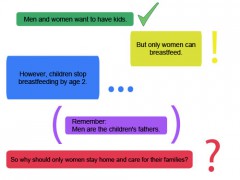Women, Welcome to the Game! But, Please, Don’t Change Our Rules

The following article deals with the topic “Implementing Board Diversity,” which will be discussed at the Global Economic Symposium in Rio this October. The author intends to enrich the discussion at the symposium with her personal stories and ideas.
I know it’s a strong title, but it’s my theory in a nutshell. In less than a week, there will be a panel at the Global Economic Symposium that will discuss how we can bring more women on board. By “we,” I mean society. By “on board,” I mean into decision-making roles in public and private companies (CEOs, presidents, partners, etc.).
For personal interest, and also to prepare myself for the GES, I’ve been reading a book called The Sexual Paradox: Men, Women and the Real Gender Gap, by Susan Pinker. It’s a polemical book, at the least. The author tries to explain the biological differences between men and women and how these facts affect their lives.
I strongly recommend reading it, so I won’t reveal all her theories and discoveries. However, she includes stories of women who left their careers to take care of their children/family, something they felt urged to do. And that’s OK. What’s not OK is how and why they did it. So, to explain my point of view, I created an infographic:
That’s an important question, because there are policies being made that relate to it. The question cannot be “what are the best policies for women, so they can be with their families.” The question should be “what are the best policies for men and women, so they can be with their families.”
Some of the reasons Susan Pinker gives to explain why there are more men in executive roles are:
– workload (and women, at some point, prefer to stay with the family) and
– high competitiveness in these roles (and women are more collaborative).
She explains these characteristics through biology, from an evolutionary perspective — which is great. However, what about culture? What about the differences in raising girls and boys? If boys are more competitive than girls, it’s not difficult understand that this attribute can be strengthened if boys only play with toy soldiers, fight and use violent games. The same goes for girls: just because women are more collaborative doesn’t mean girls can only play as teachers, moms and with dolls.
The way society treats men and women is different, and that should change. We cannot only take into account our biology, genetics, etc. — otherwise, we would live like bonobos or rhesus monkeys. We are different because we have culture, and that culture has changed over the years. And this moment in our world reflects that more changes have to come.
What’s been happening so far is that women can enter the work force, but they must follow the rules that men created. For example, women tend to be more collaborative and work in networks. Men tend to prefer hierarchy and, consequently, competitiveness. Following this path, only women who had some of these “male” characteristics got to high posts.
Finally, I believe we, women, fought to have the same rights as men. Now, it’s time for us to propose ideas and changes that can benefit both sides — changing rules, contradicting old traditions and creating new ways to work and live.

